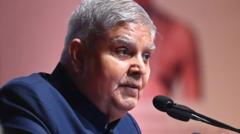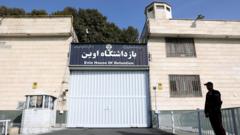Mohammed Zubair, an influential Indian fact-checker, is facing new legal challenges in connection with a post highlighting hate speech by a controversial Hindu priest, raising concerns about government harassment of journalists.
Indian Fact-Checker Mohammed Zubair Faces New Legal Battle Amid Hate Speech Controversy

Indian Fact-Checker Mohammed Zubair Faces New Legal Battle Amid Hate Speech Controversy
Mohammed Zubair, co-founder of AltNews, is back in court as police pursue harsh charges linked to his anti-hate speech activism.
In a significant turn of events, Mohammed Zubair, the co-founder of the fact-checking website AltNews, is once again in the legal spotlight in India. More than two years after the Supreme Court's intervention led to his release from prison, Zubair is set to have his petition heard by the Allahabad High Court this Tuesday. The police in Uttar Pradesh have filed fresh charges against him, alleging that his actions could “endanger the sovereignty, unity, and integrity of India.”
These newly instituted charges against Zubair hold severe penalties that could subject him to a minimum of seven years in prison or even life imprisonment. Zubair vehemently denies all allegations, asserting that he is being targeted due to his critical stance on hate speech. "I feel I’m being targeted because of the work I do," he expressed to the BBC.
Zubair's latest legal trouble stems from a post he shared on X, spotlighting hate-filled commentary delivered by Yati Narsinghanand, a Hindu priest known for his inflammatory rhetoric against Muslims. On October 3, Zubair's critique included a video of the priest’s derogatory remarks about Prophet Muhammad, statements that incited protests among Muslims outside the priest’s temple. Following the posting, police arrested attendees allegedly involved in the protests, and several Muslim organizations lodged complaints against Narsinghanand, who has previously been arrested for Islamophobic remarks.
In a troubling escalation, the complaint against Zubair shifted from previous charges related to promoting enmity between different faiths to a serious accusation under Section 152 of the Bharatiya Nyaya Sanhita, indicating a strategic move by the authorities that legal experts believe could lead to an imminent arrest. In Zubair's defense, he mentioned that he wasn’t alone in sharing the video, highlighting that many individuals, including journalists and politicians, had tweeted the same footage prior to him.
In a broader context, Zubair’s situation has drawn attention from civil rights organizations that denounce the invocation of laws perceived as tools for silencing dissenting voices. Amnesty International India decried this pattern as an attempt to intimidate those advocating for human rights and free expression. The Press Club of India has also condemned the actions against Zubair, urging the withdrawal of police complaints against him, while citing concerns that such measures could hinder the freedom of thought and critique in media.
Zubair’s previous legal troubles brought international condemnation, including concern from the United Nations, suggesting a growing pattern of hostility towards journalists in India. His earlier arrest in 2022 related to an innocuous tweet was also viewed as part of a broader crackdown on reporters challenging government narratives and hate speech. As India’s position in global press freedom rankings declines, Zubair's case exemplifies the increasing risks faced by journalists working to confront hate speech and hold authorities accountable amidst an environment of rising intolerance toward dissent.




















